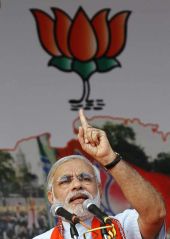 'Certainly it could embolden some Hindu extremists. It could also embolden some fundamental extremists. Probably elements on both sides would seek to capitalise and one would worry about the potential tit-for-tat escalation of violence.'
'Certainly it could embolden some Hindu extremists. It could also embolden some fundamental extremists. Probably elements on both sides would seek to capitalise and one would worry about the potential tit-for-tat escalation of violence.'
Aziz Haniffa listens to concerns at a Washington, DC think-tank about Narendra Modi's possible rise as India's prime minister.
If Gujarat Chief Minister Narendra Modi is elected prime minister after the next general election, it would most certainly embolden right-wing militancy.
This is a forecast from Tom Sanderson, co-director and senior fellow at the Transnational Threats Project at the Centre for Strategic and International Studies, a leading Washington, DC think- tank
Sanderson made this prediction in a CSIS report titled Trends in Militancy across South Asia: A Region on the Brink, which was released at a conference in Washington, DC, headlined by Lieutenant General Michael Flynn, director of the Pentagon's Defence Intelligence Agency.
'Certainly, there is no doubt that any time an individual leader who has inspired several groups like this -- RSS (the Rashtriya Swayamsevak Sangh) and others -- that you do inflame; you do push them to perhaps engage in bolder activities,' Sanderson said.
If Modi was elected prime minister, Sanderson cautioned, right-wing militant groups would 'feel that they have top cover in what they have done in the past and they can continue with what they were doing.'
During extensive field research in India and other countries of South Asia for the report, he said, 'We did look at some of these issues and time and again, especially when we looked at the Indian Mujahideen and SIMI (Students Islamic Movement of India) as well, the Babri mosque (demolition) incident in 1992 and Gujarat (riot) issue remain persistent issues and rallying cries on both sides for some of the extreme Hindu fanatics.'
'I was reminded while I was there that Hindu nationalism is fine,' Sanderson said, 'it's the Hindu fanaticism that is a problem. And now, with Narendra Modi heading towards potentially the prime ministership, the concerns about Gujarat and the leadership at the time do raise some uncomfortable questions.'
Stephen Tankel, assistant professor at American University and a non-resident scholar at the Carnegie Endowment for International Peace, echoed Sanderson's sentiments.
Tankel, author of Storming the World Stage: The Story of Lashkar-e-Taiba, said that much of Islamic militancy "is in response, of course, to communal violence. There are socio-economic grievances, but the primary driver for the Indian Mujahedeen network and the wider Indian jihadi network is in response to communal violence."
"Gujarat was the culmination of 20 years or more of escalating communal violence," Tankel said. "Since then, there has not been violence on the same scale and there have been efforts by both communities and the Indian State to try to tamper down that communal sentiment."
"But, of course, when you talk to interlocutors in India," Tankel acknowledged, "they will say there is concern beneath the surface that there is an event that can spark that."
"It's important to note that the National Investigative Agency, which was established several years ago by the Indian government, has begun to look into incidents of Hindu terrorism -- incidents which were initially hung around the necks of Indian Islamic militants," Tankel added.
"And in line with that," Tankel said, "there has also been an effort -- and here the India media is to be commended -- for pushing for prosecution of at least some of those involved in (the) Gujarat (riots) and there have been efforts to prosecute some, though, of course, not Modi."
"What would it mean if he (Modi) were to come into power? Certainly it could embolden some Hindu extremists," he said, but noted, "It could also embolden some fundamental extremists. Probably elements on both sides would seek to capitalise and one would worry about the potential tit-for-tat escalation of violence."
That said, Tankel reiterated, "This is something that folks in India take quite seriously and people in both communities do try -- not successfully -- to keep a lid on it."











 © 2025
© 2025